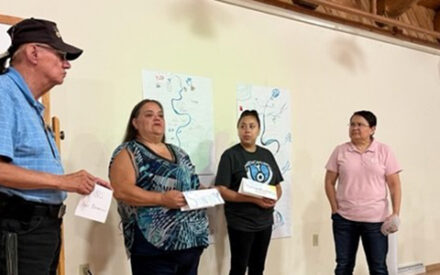Community Food Systems integrate food production, processing, distribution, consumption, and disposal to enhance the environmental, economic, social, and nutritional health of a particular place. As such, community food systems offer an alternative vision to the dominant food system by shortening the length and increasing the transparency of food supply chains while emphasizing links between food, place, and culture as well as values such as social justice, sustainability, and resilience.
One of the ways that Extension’s Community Food Systems programming advances these goals is through the development and delivery of culturally and linguistically responsive education that promotes food safety, entrepreneurship, and local food market development. Ensuring the accessibility of this programming to HMoob audiences is a priority for Extension because HMoob residents comprise one of the largest immigrant populations in Wisconsin, and the State’s HMoob community includes many small-scale, direct-market vegetable growers.
In fact, with a HMoob population of approximately 58,000, Wisconsin is home to the third-largest HMoob community in the US. HMoob farmers are significant contributors to many of Wisconsin’s farmers markets. However, research has shown that there are a range of substantive, interpersonal, and resource-related barriers to providing training to HMoob farmers on topics such as food safety. Recent research also cites that an organization’s lack of understanding of Hmong communities can perpetuate inequitable access to programs and services. To address these barriers, Extension has worked to understand and respond to the training needs of HMoob farmers and food entrepreneurs.
Looking at Food Safety, Licensing, & Regulations
Beginning in 2021, the UW-Madison Extension Community Food Systems Program began working with external partners such as the Wisconsin Department of Agriculture, Trade & Consumer Protection (DATCP) to develop more culturally and linguistically responsive educational programs for Wisconsin’s HMoob growers and food entrepreneurs. Training topics have included food safety, food licensing regulations for fresh and prepared foods, record keeping, land rental agreements, and grant programs for farmers. The objective of these trainings is to familiarize HMoob farmers and small-scale food entrepreneurs with resources, regulations, and best practices to improve the safety and success of their farm and food businesses. In 2023, there were eight training events, including a field day, that served over 175 majority HMoob farmers and food entrepreneurs.
These trainings were developed and hosted by Extension in partnership with state agencies (e.g., DATCP) and farmer-serving organizations. They built on feedback from previous program participants, focus groups, and an in-person farmer survey conducted in HMoob by an Extension staff member and native speaker. As a result of this input, training promotion and design was modified to better serve HMoob farmers and food entrepreneurs by engaging trusted HMoob-led partner organizations, such as the Eau Claire Area Hmong Mutual Assistance Association, to serve as event host sites and co-promote the events to their members. Extension also modified training content and format to increase opportunities for hands-on participation. At one training session on food safety, participants built and took home produce wash stations. All trainings were conducted in both English and HMoob and were led by or in partnership with native HMoob speakers with professional experience in the fields of agriculture and community development.
Lifting Underserved Communities
As a result of this programming, Extension reached new audiences, namely HMoob farmers and small-scale and aspiring food entrepreneurs. After (1) increasing our staff capacity to serve HMoob farmer and food business audiences and (2) making improvements to program outreach and design, HMoob participation records markedly increased. Demand even exceeded capacity for at least one of the trainings.
Additionally, participant evaluations show that participants gained valuable knowledge about topics such as food safety and licensing. For example, over 60% of the participants of the food licensing training reported have no prior training in food safety. And nearly 90% of the participants reported that they were more confident in their ability to meet county licensing requirements and to know where to find the appropriate information because of the training.
Finally, participant evaluations showed the value of expanding access to new audiences. Participants remarked that they appreciated having culturally and linguistically accessible workshops on food and farming topics. As one participant commented: “Thank you for being cognizant of Asian based food scenarios.” Another participant remarked: “Thanks so much for hosting this workshop for the community! It was really exciting to see so many potential entrepreneurs, especially from the HMoob community. Appreciate the education and resources to empower and lift underserved communities!”
Download Article

 Depth-to-Bedrock: Updated Mapping & Decision-Making
Depth-to-Bedrock: Updated Mapping & Decision-Making Building High-Quality Programs to Help Youth Thrive
Building High-Quality Programs to Help Youth Thrive Nature’s Navigators: Supporting Neurodiverse Learners
Nature’s Navigators: Supporting Neurodiverse Learners Centering Culture & Language in Leadership Programs
Centering Culture & Language in Leadership Programs


